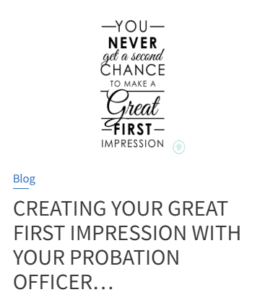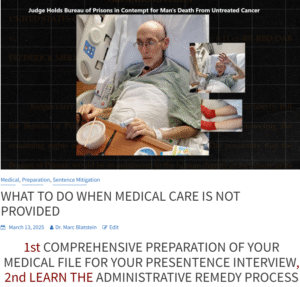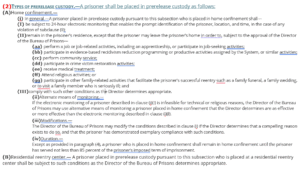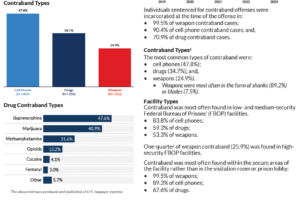FEAR OF SENTENCING AND GOING TO PRISON
HOW DO YOU COUNTER THE FEAR OF THE UNKNOWN?
WHAT CAN YOU DO?
S
Find a Group or Someone To Talk To
Someone Who’s Been Through This – You’re Not Alone
⇓ This White-Collar Support Group is a Great First Start ⇓
s
s
THEN CONSIDER PREPARATION – BEYOND THE LEGAL
Should Alcohol, Gambling, Drugs, or other issues be relevant to your charges, have you started on your own before the Indictment, PSI interview, or Sentencing to start therapy? If so, begin gathering verification for your Narrative or Story.
A
1ST:
- BEGIN REQUESTING LETTERS THAT ATTEST TO YOUR CHARACTER

- PRESENTENCE INTERVIEW: MAKING THAT GREAT FIRST IMPRESSION
- GATHER, ORGANIZE, AND SPELLCHECK ALL OF THE DOCUMENTS THAT THE PROBATION OFFICER HAS REQUESTED FROM YOUR ATTORNEY.
- HAVE EVERYTHING PREPARED AND PROVIDED TO THE OFFICER 7-10 DAYS BEFORE YOUR INTERVIEW.
- THAT WILL ALLOW THEM TIME TO DO THEIR WORK AND THEN, AT THE MEETING, GET TO KNOW YOU, PERSONALLY.
- YOU’LL NEVER GET A SECOND CHANCE – TO MAKE A GREAT FIRST IMPRESSION
- WITH YOUR OFFICER, AT YOUR PRESENTENCE INTERVIEW →
F
YOUR NARRATIVE
This includes:
- Your story or autobiography (The Good – The Bad – and The Ugly)
- Why did you commit the crime? What happened in your life?
- Why? Because judges understand that crimes do not happen in a vacuum.
- What happened to you that caused this change in your life’s trajectory?

- If you have a Medical Record, spread among Physicians, Hospitals, Labs, Diagnostic Centers, all of those records should be organized and provided before your PSI.
- If you have not seen a Physician or Dentist lately, I recommend that you do so quickly as you do not want a healthcare surprise in prison.
Acknowledgement of the E Factors (What are these?) – Included In Your Narrative:
- E Factors refer to circumstances that may warrant a departure from the sentencing guidelines established by the United States Sentencing Commission. These factors include aspects of the offense or the offender’s background that the guidelines do not adequately consider. Some examples of E factors include:
-
- The defendant’s role in the offense
- The defendant’s criminal history
- The presence of substantial assistance provided by the defendant to law enforcement
- The defendant’s mental or physical condition
- The defendant’s acceptance of responsibility for the offense
- Any other relevant factor that justifies a departure from the guidelines
Acknowledgement of the F Factors – These Come From Your Narrative:
- F Factors refer to circumstances that may justify imposing a sentence below the guideline range, even if a departure is not warranted. These factors are also considered under 18 U.S.C. § 3553(a) and include:
-
- The nature and circumstances of the offense
- The history and characteristics of the defendant
- The sentence must reflect the offense’s seriousness, promote respect for the law, and provide just punishment.
- There is a need to afford adequate deterrence to criminal conduct.
- The public needs to be protected from further crimes the defendant may commit.
- The defendant must receive educational or vocational training, medical care, or other correctional treatment.
A

A
THE OFFICIAL PRESENTENCE REPORT (PSR)
- When there is a Medical Record, The PSR Becomes Your Medical Referral.
- EVEN INCLUDED, MEDICAL CARE IN PRISON HAS LEFT SOME GOING TO THE COURTS FOR COMPASSIONATE RELEASE.
- Medical Co-Payments?
- Judges use the PSR to determine the length of a sentence.
- The Bureau of Prisons (BOP) uses the same PSR for prison placement.
- Probation again uses the PSR during Supervised Release.
- Lastly, this same PSR becomes a permanent part of your record and is known as the inmate’s Bible.
- It’s truly the gift that keeps on giving.
A
SENTENCING HEARING, YOUR CONVERSATION WITH YOUR JUDGE,
- ARE YOU READY?
- DID YOU TAKE THE TIME TO WRITE A WELL-THOUGHT-OUT NARRATIVE OF YOUR LIFE STORY?
- IF YOU DID, THEN IT MADE AN IMPACT WITH YOUR PROBATION OFFICER, AND NOW YOUR JUDGE MAY WANT TO KNOW MORE ABOUT YOU.
- FROM THE HEART, THIS “IS” YOUR MOMENT.
A

A
YOU’VE MADE JUST 1 PLACEMENT REQUEST AND THE JUDGE AGREED, BUT
- YOU HAVEN’T BEEN NOTIFIED: WHAT DO YOU DO, OR WHERE DO YOU GO?
S
A
PREPARATION BEFORE YOUR SURRENDER
- Learn what prison you have been designated to, then ensure they expect you. Did your court paperwork arrive? Are you listed on the BOP website?
- If it’s a Satellite Camp – You Surrender to the Higher Facility or Prison.
- While the Higher Secure Prison may house Violent Persons, you will not (Should Not) be interacting with them.
- You will Interact with the staff, and as they deal with Violent persons (or higher security persons), their attitude toward you may reflect the same harshness.
- …in other words, it won’t be a warm welcome or warm first impression.
- Bring actual or copies of your Driver’s License, Social Security Card, Medical File, prescriptions for your Medications, and Medical Device, if applicable.
- If you had a court-ordered penalty (i.e., Restitution), Paid it in Full, bring Proof. If you do not have proof, contact your attorney ASAP to get that to you before you Surrender. Next, once you have proof that you do not have any court-ordered payment responsibilities, you can keep any amount of money in your Trust or Commissary account.
- Sending Money: Western Union is $3 – $500, MoneyGram is $300, Max, and BOP Lockbox is any amount.
- Wedding Band, Religious Neckless; Max value of $100 is permitted. No stones.
- Release Plan, Phone Contact list (No Color, Not Double Sided): Bring it saying that you read online that this was important, and I wanted to give it to my Case Manager. You can also mail it to yourself that day [no more than three pages per envelope]).
- The soonest early release is after you’ve served 25% of your time.
- The 1st Case Manager meeting is within 30 Days.
- If you’re going to a Satellite Minimum Camp, after being screened and boxing your clothes to be sent home by the BOP, expect to be put into an isolation cell. This could take hours or days for various reasons—just don’t be surprised. If you have already set up the books on a schedule, you may get them today or tomorrow.
A
A
2ND:
BEFORE PRISON, DEVELOP YOUR ROUTINE
We’re all creatures of habit, and every day we unconsciously have a Routine. Everything from getting up, exercising, getting the kids ready for school, and we getting ready for work. Breakfast alone or with our significant other, these are all things that we do, and repeat daily; our Routine.
Creating the outline of your Routine before your surrender (or being remanded), once inside is a first step, and not an easy one at that.
- Job
- Exercise
- Reading. I hope you like to read, because this will help: 1) Your Release Plan Grow, as long as you document what you’re reading (Non-Fiction), 2) FSA Programs (Document these too as you take them), and then tutoring others (GED) or teaching a class that your Case Manager agreed to.
a
INSURANCE
- WHY?
- If you’ve taken a 1) FSA class, 2) read a book that had content that you chose to note down and remember, or 3) you had a conversation with a BOP Correction Staff; for each of these logging the day – date- time and what happened or what you learned, this all acts as a PAPER TRAIL, THAT LIKE INSURANCE, you don’t think you’ll need it – until you do.
- WRITING DOWN EVERYTHING, DAILY. This also builds up your Release plan.
a
CONSTRUCTIVE ACTIVITIES
- WHAT IS THIS: tutoring, working your job (don’t pay others), mentoring others academically, and reading
a
FACT: FSA – ETC – GTC ≠ EARLY RELEASE = HC
- THIS MAY BE POLICY AS OF 6/17/2025
- BUT HUMANS [CASE MANAGERS] AND WARDENS, EACH MAY HAVE A BAD DAY, AND THE BOP IS AN AGENCY WITH A CULTURE.
- WILL ALL 122 PRISONS GET IT RIGHT DAY ONE? DON’T THINK SO
- Pre-Release Custody

A
A
OR, YOU CAN LOSE IT ALL 
- Avoiding Cell Phone Risks
- It is just one way.
A
c
c
c
c
COMING HOME: CAN BE THE HARDEST PART. ARE YOU PREPARED?
A
STILL STRUGGLING?
TAKE 13 MINUTES AND LISTEN TO ADMIRAL MCRAVEN’S WORDS AND EXPERIENCES, TO NEVER GIVE UP.
HOPE: IT COULD JUST CHANGE YOUR LIFE.
Admiral William H. McRaven, rising to become the Pentagon’s Joint Special Operations commander, masterminded the successful special ops raid on Osama bin Laden in 2011. His experiences hold true for any challenging situation, including those facing federal indictments and temporary imprisonment.
His Lessons to Live By, inspired by leaders from Mandela to a young girl in Pakistan, Malala, should leave you with hope.
X
X
X


